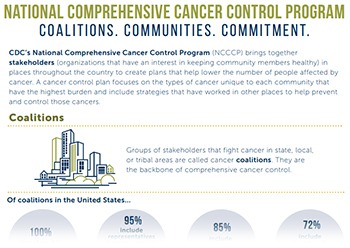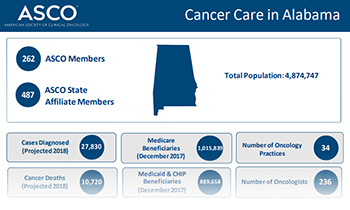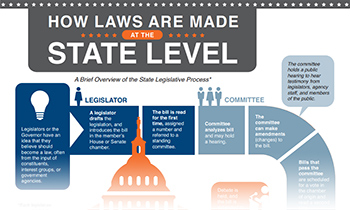NCCS is now Cancer Nation. Find out more about our next chapter. Join Us
State-Based Cancer Advocacy
Intro/Overview
The CDC’s National Comprehensive Cancer Control Program (NCCCP) was created in 1998 to help states create coalitions, identify the cancer landscape and burden in their area, prioritize proven strategies for cancer control, and develop cancer plans and put them into action.
NCCS is among 19 national partners of the NCCCP where we work to assist comprehensive cancer control coalitions (CCC’s) to develop and sustain cancer control plans.
Quick Links
CDC has six priorities for the cancer control coalitions it funds:
- Stress primary prevention and make healthy choices to stop cancer before it starts.
- Help people find cancer early by getting screened at the right time.
- Support people diagnosed with cancer (survivors) through their treatment and beyond.
- Provide proven strategies for states, health care networks, and others to put into place, making sure cancer control efforts are effective for everyone who needs them.
- Promote access to good health care for everyone.
- Study policies and programs to make sure they are effective.
What is State-Based Advocacy?
Advocacy doesn’t just happen on Capitol Hill in Washington, D.C. State level advocacy is one of the most important ways to affect change, because as they say, “all politics is local.” State advocacy is action or support for a policy change or recommendation that takes place at the state and local level by individuals who live in those communities and are directly impacted by those policies.
Cancer Policy: “Big P” vs. “Little P”
State-based advocacy comes in many shapes and sizes. Peggy Johnson of the Kansas Cancer Partnership says that she categorizes state policy into two buckets: “Big P” and “Little P.”
“Big P” represents policy changes which require a new law or changing an existing law to be passed by the legislature and signed by the governor. An example of a Big P policy is Kansas’s Clean Indoor Air law prohibiting the use of tobacco products inside buildings, including offices, restaurants, stores and other public buildings.
“Little P” policies require a change in regulations or code and can be accomplished through working with the office or agency which has oversight for the regulations or codes. An example of a Little P policy is a state ban on the use of electronic cigarettes or pipes in public buildings.
Building Relationships with State Coalitions and Lawmakers
Because there are many avenues for affecting policy change at the state level, cancer control coalitions are critically important as they bring various stakeholders to the table, including experts on cancer such as health departments, community organizations, researchers, health care providers, decision makers, and cancer survivors and their families. These stakeholders come together to address cancer concerns in their communities. The comprehensive cancer control coalitions are an excellent way to get involved in state-based advocacy efforts.
Because state and local lawmakers live in the communities in which they work year-round, it’s often easier to meet with them or get them on the phone. Developing relationships with staffers and lawmakers at the local level is a key part of state-based advocacy. While there is much work to be done at the national level to improve cancer care, cancer burdens and strategies vary from state to state. For this reason, it is critical that community leaders and patient advocates work to address the specific issues regarding cancer in their state.
A major function of CCCs in convening stakeholders is to develop a cancer control plan that focuses on the cancer issues unique to their state (or regions within their state)—these coalitions are the backbone of comprehensive cancer control. By becoming involved in your state’s cancer coalition, you can help ease the burden of cancer and engage in strategies to help prevent and control cancer in your community. As a national partner of the NCCCP, NCCS is here to assist advocates in partnering with their state coalitions and supporting cancer coalitions as they develop and carry out their comprehensive cancer control plans.
Find Resources in Your Area
Each state, territory, or tribal coalition develops a Comprehensive Cancer Control (CCC) plan to identify and address the burden of cancer in its geographic area. The plans are specific to each region and based on data collected about people living there. Below you will find links to your local cancer control plan, cancer control coalition, and legislature website. Because the coalitions and the cancer plans are specific to each state, they vary greatly in their content and resources.
Tools For Your Advocacy Efforts
NCCS Advocacy Toolkit
Check out our Advocacy Toolkit which outlines what advocacy is, how a bill becomes a law, and provides several tools for advocacy with care planning legislation as an example of how to take part in advocacy. The toolkit has important tips for using media tools in advocacy efforts and for meeting and calling decision makers.
NCCS Webinar: “State-Based Cancer Advocacy”
Watch NCCS’ webinar on advocacy at the state level lead by Peggy Johnson, the Co-Chair of the Kansas Cancer Partnership. This webinar outlines the comprehensive cancer control program and how the Kansas Cancer Partnership has participated in state advocacy efforts to improve cancer care.
WEBINAR INFO:
From comprehensive cancer control programs to governors and state legislators getting involved in cancer policy, you can help improve the access and delivery of cancer care for those right in your own community. To help explain numerous advocacy opportunities at the state level, we’re joined by Peggy Johnson, Executive Director and Chief Operating Officer of Wichita Medical Research and Education Foundation.




